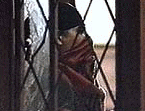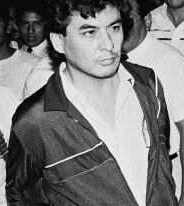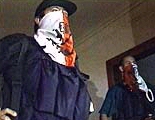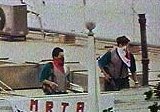A Brief History Of The MRTA
Movimiento Revolucionario Túpac Amaru
(Túpac Amaru Devrimci Hareketi) (MRTA)

The Tupac Amaru Revolutionary Movement (MRTA) are part of a
long tradition of anti-colonial liberation struggles. They see
themselves as an organization of the people, and they stress the
importance of working together with other organizations such as
trade unions, workers' groups, students, and peasants.
The goal of this cooperation is the creation of a popular
front movement, on the basis of which a new, socialist society
will be created. The MRTA feels that this goal cannot be achieved
through parliamentary politics alone, which is why the
organization went underground shortly after it was founded and
began forming armed units. The economic vision of the MRTA is a
mixed economy based on communal planning. This would allow for
limited private ownership, but an emphasis would be placed upon
communal ownership.

Chronology
1984 : The MRTA is founded by organizations from the radical-left,
including the MTA and the MIR-IV.
1985 : The pirate radio station "November 4" broadcasts MRTA
communiques and calls for the people to boycott the elections and
support the armed struggle.
February 1987 : The MRTA occupies seven radio stations in Lima and
reads a communique against the increasing militarization of the
society.
 July 1988 : An MRTA commando kidnaps retired air force general and
businessman Garcia.
July 1988 : An MRTA commando kidnaps retired air force general and
businessman Garcia.
October 1988 : The MRTA commandeers a truck full of chickens and
distributes the food to striking miners.
February 1989 : Police arrest MRTA leader Victory Polay and
imprison him in Canto Grande prison in Lima.
April 28, 1989 : The military surrounds a large MRTA unit. After
heavy fighting, which included air force bombings, the guerrillas
were captured and executed that same day on the orders of the
commanding officer. Around 62 people, including 20 civilians, were
murdered by the military.
End of the 1980s : The MRTA becomes increasingly active in rural
areas. In the San Martin department, a strong popular movement
against the central government in Lima has been formed.
January 9, 1990 : An MRTA commando shoots former Defense Minister
E. Lopez Albujar, the man who ordered the April 28, 1989 execution
of MRTA prisoners.
July 1990 : Victor Polay and 46 other comrades escape from Canto
Grande prison via a 315 meter long tunnel.
April 1992 : A leading member of the MRTA, Peter Cardenas Schulte,
is arrested.
May 1992 : The police raid a computer center of the MRTA and gain
important information about the movement's internal structure.
June 10, 1992 : Victor Polay is arrested again.
November 30, 1995 : After Fujimori has declared victory over
terrorism and the death of the MRTA, 30 Tupac Amaristas are
arrested after a plot to occupy the Peruvian Congress, holding its
members hostage in exchange for jailed MRTA militants, was foiled.

December 17, 1996 : An MRTA commando occupies the Japanese
ambassador's residence in Lima, under the slogan "Breaking the
silence! The people want them free!", and take all the guests at a
reception in honor of Japan's Emperor hostage. Most of the
hostages are soon released, but the commando continued to hold 72
people, including the brother of President Alberto Fujimori,
several generals and heads of police divisions, Peru's Foreign
Minister, Supreme Court judges, Members of Congress from the
ruling party, and the Ambassadors from Japan and Bolivia.

Struggle Against Neo-Liberalism!
Neo-liberalism is not a new form of capitalist economics.
Neo-liberal policies, which have been brutally practiced for
decades by the International Monetary Fund (IMF) and the World
Bank, are a form of imperialist exploitation. The term "liberal"
confuses many people, since it is often associated with
progressive politics. But freedom under neo-liberalism is not for
people, rather for capital. The function of the state is to be
reduced to providing internal and external security. All forms of
social policy are to disappear, since they degrade the conditions
for capital and create regional disadvantages with respect to the
world market. Without regard for the effects on the population,
budgets are slashed, cut, and rationalized away.

These days, there is increasing competition between states in
the interest of international capital. Even the "welfare states"
among the industrialized nations are seeking to secure their
competitiveness by slashing social programs. In the so-called
Third World, for example in Latin America, these policies, with
all their catastrophic consequences, are a continuing form of
imperialist exploitation.
 Ana sayfaya dönüş [Return]
Ana sayfaya dönüş [Return]


 July 1988 : An MRTA commando kidnaps retired air force general and
businessman Garcia.
July 1988 : An MRTA commando kidnaps retired air force general and
businessman Garcia.

